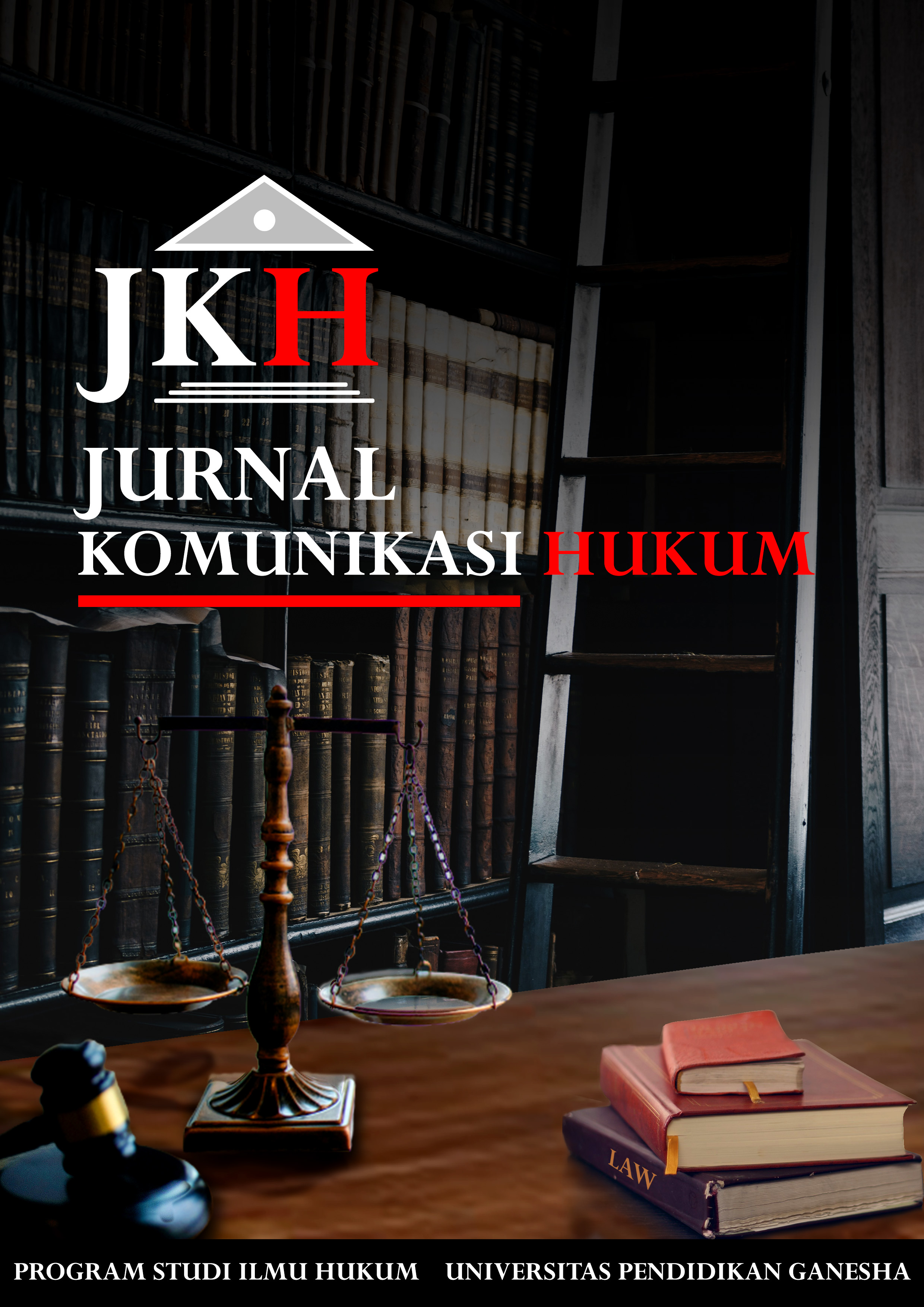PENGATURAN PEMBATASAN EKSPANSI PERUSAHAAN GROUP DI SEKTOR PERTAMBANGAN BATUBARA DITINJAU DARI UNDANG-UNDANG NO. 40 TAHUN 2007 TENTANG PERSEROAN TERBATAS
DOI:
https://doi.org/10.23887/jkh.v8i1.44062Keywords:
Ekspansi, Perusahaan Group, Perseroan TerbatasAbstract
Berkenaan dengan pertumbuhan bisnis pertambangan batubara di Indonesia tentunya harus diimbangi dengan pemenuhan ketentuan peraturan perundang-undangan yang berlaku, maka yang menjadi tujuan dalam penelitian ini adalah menganalisis Pengaturan Pembatasan Ekspansi Perusahaan Group di Sektor Pertambangan Batubara Ditinjau dari Undang-Undang No. 40 Tahun 2007 tentang Perseroan Terbatas. Penelitian ini menggunakan metode penelitian bersifat yuridis empiris, yaitu cara prosedur yang dipergunakan untuk memecahkan masalah penelitian dengan meneliti data sekunder terlebih dahulu untuk kemudian dilanjutkan dengan mengadakan penelitian terhadap data primer di lapangan. Adapun jenis penelitian yang digunakan adalah Penelitian Kepustakaan dan Penelitian Lapangan. Hasil penelitian adalah Pembatasan pembentukan layer perusahaan group (anak, cucu dan cicit) perusahaan tidak diatur di dalam Undang-Undang No. 40 Tahun 2007 tentang Perseroan Terbatas. Adapun pembatasannya dihadapkan pada Undang-Undang No. 5 Tahun 1999 tentang Larangan Praktik Monopoli dan Persaingan Usaha Tidak Sehat. Hal ini terkait dengan angka threshold dan indikasi melanggar Undang-Undang No. 5 Tahun 1999 tentang Larangan Praktik Monopoli dan Persaingan Usaha Tidak Sehat. Selanjutnya, Dalam Undang-Undang No. 40 Tahun 2007 tentang Perseroan Terbatas, interlocking directors tidak dilarang, tetapi dalam hal ini pelaku usaha harus hati-hati dan jangan sampai melanggar Undang-Undang No. 5 Tahun 1999 tentang Larangan Praktik Monopoli dan Persaingan Usaha Tidak Sehat khususnya terkait dengan hal jabatan rangkap.Downloads
Published
2022-01-27
How to Cite
Hartana, H. (2022). PENGATURAN PEMBATASAN EKSPANSI PERUSAHAAN GROUP DI SEKTOR PERTAMBANGAN BATUBARA DITINJAU DARI UNDANG-UNDANG NO. 40 TAHUN 2007 TENTANG PERSEROAN TERBATAS. Jurnal Komunikasi Hukum (JKH), 8(1), 233–243. https://doi.org/10.23887/jkh.v8i1.44062
Issue
Section
Articles
License
Authors who publish with this journal agree to the following terms:- Authors retain copyright and grant the journal right of first publication with the work simultaneously licensed under a Creative Commons Attribution License that allows others to share the work with an acknowledgement of the work's authorship and initial publication in this journal.
- Authors are able to enter into separate, additional contractual arrangements for the non-exclusive distribution of the journal's published version of the work (e.g., post it to an institutional repository or publish it in a book), with an acknowledgement of its initial publication in this journal.
- Authors are permitted and encouraged to post their work online (e.g., in institutional repositories or on their website) prior to and during the submission process, as it can lead to productive exchanges, as well as earlier and greater citation of published work (See The Effect of Open Access).
Authors who publish with this journal agree to the following terms:
- Authors retain copyright and grant the journal right of first publication, with the work [SPECIFY PERIOD OF TIME] after publication simultaneously licensed under aCreative Commons Attribution License that allows others to share the work with an acknowledgement of the work's authorship and initial publication in this journal.
- Authors are able to enter into separate, additional contractual arrangements for the non-exclusive distribution of the journal's published version of the work (e.g., post it to an institutional repository or publish it in a book), with an acknowledgement of its initial publication in this journal.
- Authors are permitted and encouraged to post their work online (e.g., in institutional repositories or on their website) prior to and during the submission process, as it can lead to productive exchanges, as well as earlier and greater citation of published work (See The Effect of Open Access).












